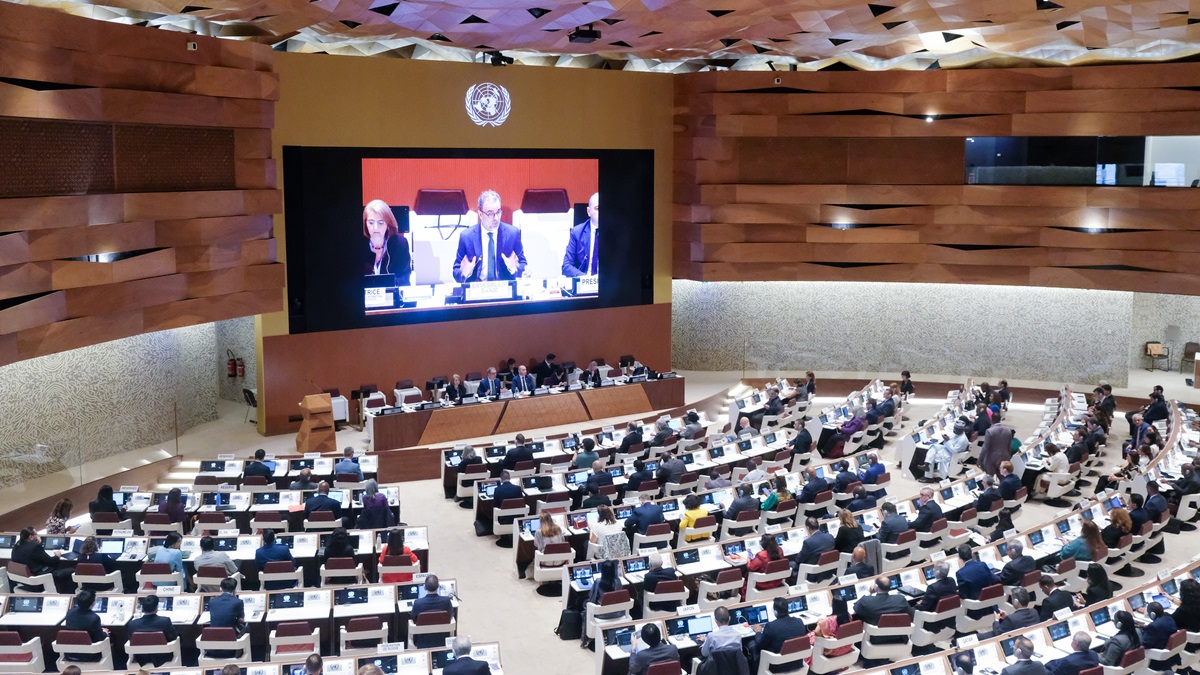The world comes together at the United Nations, taking bold actions to protect consumers and promote fair competition in an increasingly digital and globalized economy.
© UNCTAD Photo | Deputy Secretary-General Pedro Manuel Moreno (middle on-screen) opened the 9th United Nations Conference on Competition and Consumer Protection on 7 July in Geneva.
Key takeaways:
New momentum to promote product safety: UN principles aim to close global regulatory gaps.
Cross-border redress breakthrough: New declaration and platform proposal to bring fair remedies to global consumers.
Governing artificial intelligence: Urgent calls to ethical use and protect consumers from manipulation.
Competitive and fairer food supply chains: Pro-poor competition policies needed to end hunger and provide opportunities for small businesses.
The 9th United Nations Conference on Competition and Consumer Protection concluded on 11 July with a clarion call to safeguard fair, open and competitive markets as digital transformation profoundly reshapes consumption, supply chains and the global economy.
Hosted every five years by UN Trade and Development (UNCTAD), the conference is the world's highest-level multilateral meeting on competition and consumer protection.
Over the past week, over 500 participants – government ministers, diplomats and civil society leaders – from more than 100 countries convened in Geneva to navigate pressing challenges and chart a bold new course for the future.
Discussions have ranged from unsafe products and cross-border scams to artificial intelligence (AI) for consumer markets and improving competition in digital markets.
The conference also marked two milestones: The 45th anniversary of the adoption of the United Nations Set of Principles and Rules on Competition and the 40th anniversary of the adoption of the United Nations Guidelines for Consumer Protection.
Deputy Secretary-General Pedro Manuel Moreno of UN Trade and Development (UNCTAD) hailed both documents as “living tools, designed to evolve and to serve people”, calling for redouble efforts worldwide.
“I call on all of you — governments, experts and partners — to renew your commitment,” Mr Moreno urged participants.
“Together, we can ensure that markets are not only efficient but also fair. Not just open, but inclusive.”
Watershed moment for consumer product safety
Unsafe products anywhere could pose threats to consumers everywhere in a world underpinned by interconnected markets and fast-moving supply chains. But alarmingly, 44% of UN member states still lack legal frameworks on product safety.
That’s why delegates have moved to endorse a draft resolution proposing the first-ever United Nations Principles for Consumer Product Safety, driven by UN Trade and Development’s long-standing work and consensus-building under its Intergovernmental Group of Experts on Consumer Protection Law and Policy.
The resolution will move on to the UN General Assembly for formal adoption, with the potential to define global standards for safer products across borders.
Breakthrough on cross-border redress
UN Trade and Development research shows that in 2022, global e-commerce hit $27 trillion. Transnational transactions only accounted for under one quarter of the global total, in part due to low consumer trust in mechanisms currently available to resolve disputes beyond borders.
This week’s conference makes a difference with a new Declaration on Cross-Border Dispute Resolution and Redress, presented by the Dominican Republic and adopted by consensus.
The declaration reflects a unified global commitment to ensure that consumers, wherever they are, have access to fair and timely remedies when necessary.
To make this vision a reality, UN Trade and Development unveiled a proposal for a global open-source online dispute resolution platform.
Designed to be interoperable, scalable and consumer-friendly, this platform aims to streamline cross-border complaint handling while helping countries build much needed legal and institutional capacity.
Promoting consumer rights in the age of AI
The rapid rise of AI was also in the spotlight, with a special session underscoring the need for global cooperation to govern and harness the frontier technology for consumers’ benefit.
Put to the right use, AI has the power to make consumer protection systems more agile and responsive.
In this regard, the conference showcased success stories of how consumer protection agencies already leverage AI tools to identify harmful business practices, process complaints and streamline enforcement actions.
Competitive food markets for all
Turning to food value chains, UN Trade and Development analysis has flagged that the top four companies control up to 70% of the agrochemical market and over 85% of global grain trade.
Such concentration gives a handful of multinational companies immense bargaining power, often at the expense of farmers, food workers and consumers.
To reverse the trend, the conference called for "pro-poor" competition policies to keep markets open, fair and conductive to encouraging sustainable solutions and opportunities for smallholder players.
It also highlighted the importance of sustainable consumption and production in the context of the circular economy, including the need for stronger consumer information systems and legal frameworks to support green and just transitions in developing countries.
Global cooperation needed more than ever as stakes are high
The conference closed with a heightened sense of shared purpose, that open, fair and inclusive markets are not a given. Instead, it requires unwavering efforts individually by countries and collectively by the international community.
This entails moving from diagnosing problems to deploying solutions, ensuring that consumers are empowered and protected everywhere, and that markets work not just for the powerful few but for all.
To this end, the conference helped reinforce regional platforms for stronger, coordinated competition and consumer protection enforcement, highlighting model initiatives in Africa and Latin America for joint investigations, data sharing and institutional training.
UN Trade and Development also remains committed to improving international collaboration on competition through the Guiding Policies and Procedures on cooperation for competition which facilitates cross-border enforcement and builds mutual trust among national authorities.

